
Aging In Place, A Complete Step By Step Guide
Starting With Downsizing, Decluttering, Organizing & Safeguarding Your Homes
Working Towards Staying Put In Your Own Neighborhood When Aging In Place:
Home Safety, Downsizing,
Why Conventional Houses May Not Be Suitable For Aging In Place,
Inclusive Neighborhoods For All Ages,
Low Maintenance Houses, Decluttering.
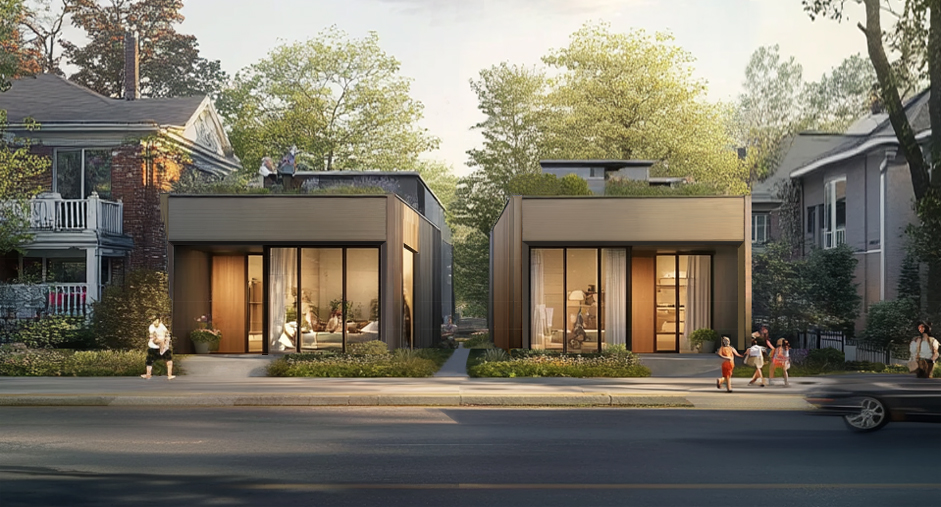
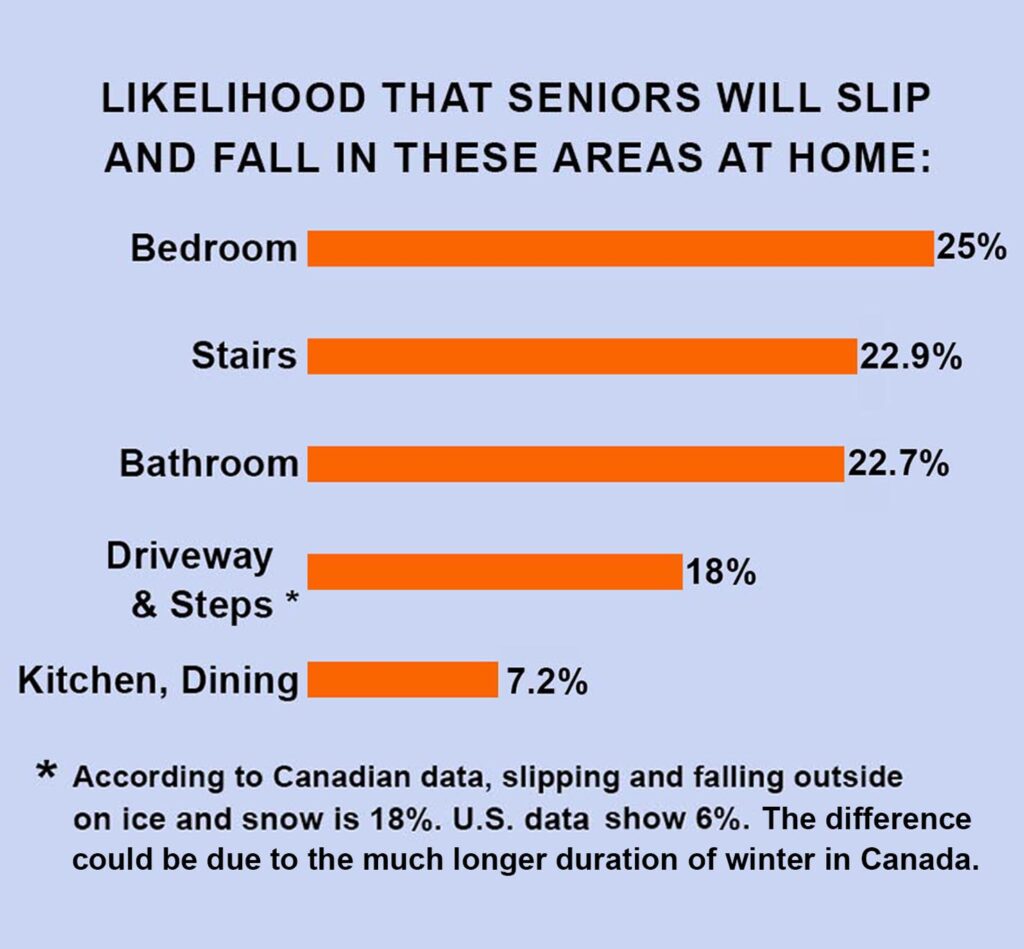
Know These Danger Zones
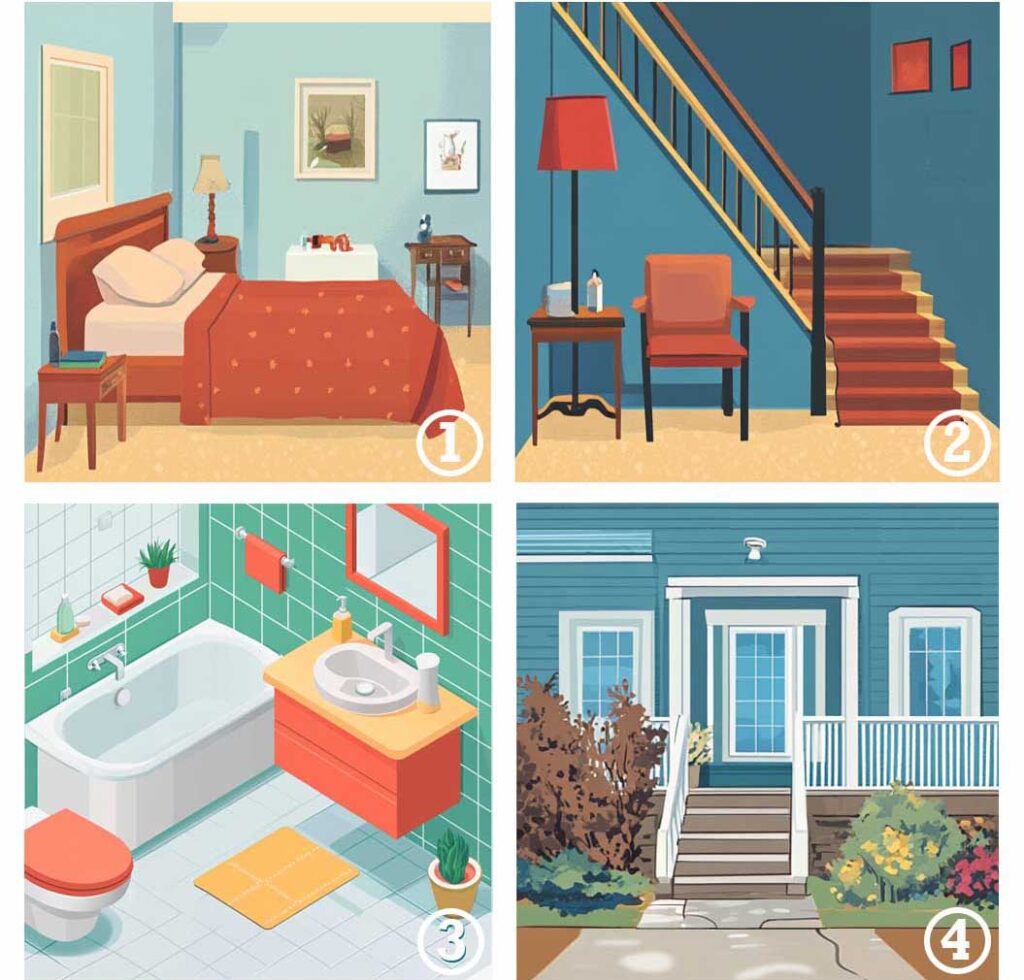
Home Sweet Home
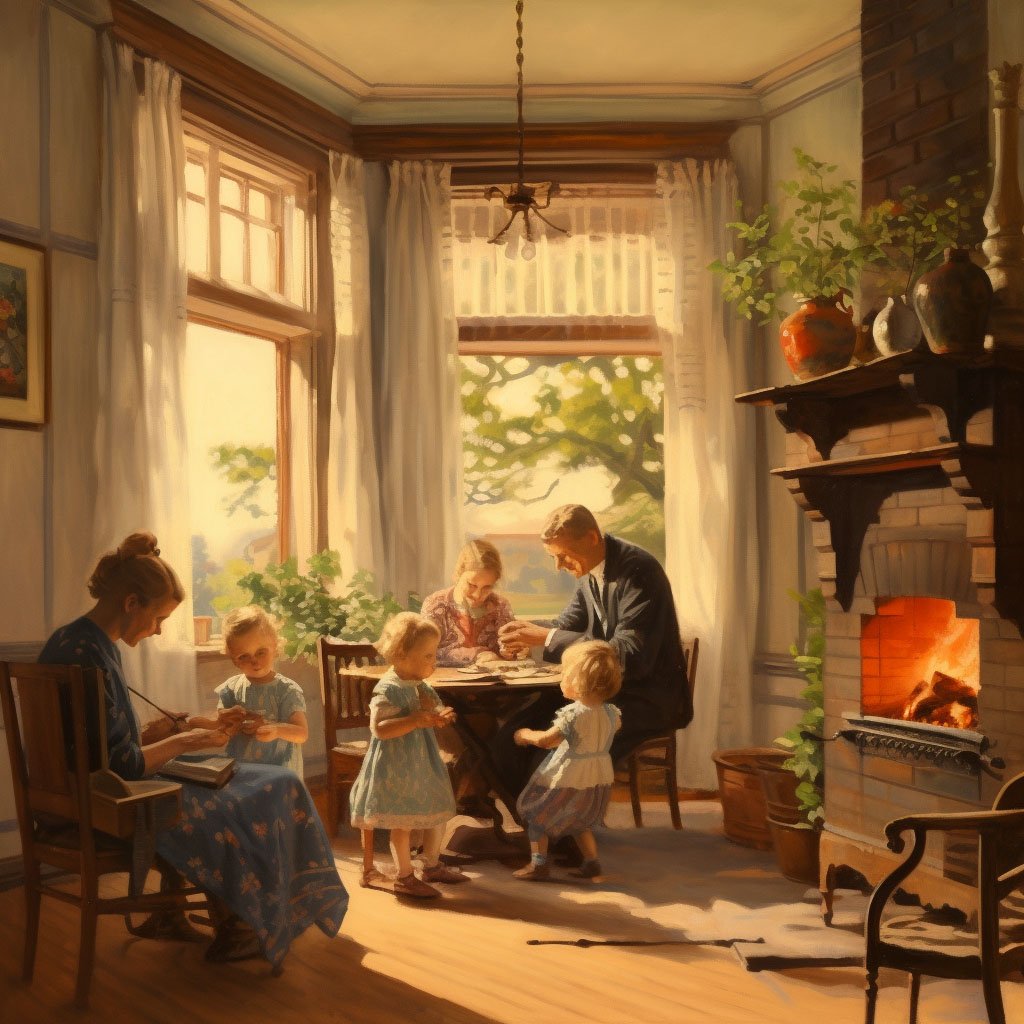
Why Conventional Houses May Not Be Suitable For Aging In Place

- Sleeping Quarters Are On An Upper Level
- Dangerous Roof Shapes
- Too Much Maintenance Due To Ways Houses are Built
- Yards Too Big For Seniors To Handle
Foreword:
The senior population of Canada in 2023 is about 20% of the nation’s total. It is estimated that the percentage will double in the next twenty years. By the same token, the US senior population is about 18%. Whereas Japan has the world highest senior population of over 30%. These number will rise drastically in the next 20 years.
Governments are encouraging us to age in place which is the least costly way to live out our retirement years for our country, but not necessarily for ourselves. Furthermore, after the first deadly waves of the Covid pandemic, some of us are telling the governments that keeping seniors in lockdown in organized living situations just didn’t work. The problem is, our systems are full of holes and this blog aims to point them out and offers ways to fix them.
About The Blog And Its Author:
Hi, my name is Po Ku, a 74-year-old retired builder. I’ve designed and built houses since 1975. I graduated with an B.Arch. in 1977 from Dalhousie University in Nova Scotia and became a registered architect in Alberta in 1980. Here at The Seniors’ Blog, we want to help seniors live on their own and stay comfortable in their homes. To achieve that, both you and your home must be in relatively good shape for a long and happy life.
Why You Should Read This Blog:
The blog offers simple tips on aging in place, seniors’ health, home upkeeping, decluttering, downsizing, minimalism, and technology for seniors. If you’re 55 or older, now is the time to act. Therefore, being prepared is important! If you’re an empty nester who hasn’t thought about aging in place, this blog will make you think.
Before making a decision – whether to buy, build, renovate or move, read this blog first. Otherwise, managing your home will become overwhelming. You might end up moving to an apartment or retirement home too soon. In any case, the move may not be right for you if you favor privacy, personal space, and living on your own.
A Few Words From The Author:
“I am only here to share my experiences with you. Over time, I’ve seen many avoidable problems in homes, especially for seniors. It is true that we can get set in our ways, but small changes may make a big difference. Think of this blog as friendly advice from one senior to another.” – Po Ku
Table Of Content:
Post Titles are shown at the top of page Menu Bar, click the post name below to go the post you want to read.
Seniors Help – Help and Support:
Watch Out for the Danger Zones in and around your house. Implement Home Safety Ideas. Access an useful list of resources and supports available for seniors to help you aging in place. How to navigate our healthcare system.
Home Service Guide – Finding Tradesmen:
Learn how to find trusted workers for home repairs and maintenance. Monthly home service schedule. What to look out for in and around your house. If you consider so much work may not be worth your while, think hard why conventional houses not suitable for most of us seniors who desire aging in place.
Saving Money – Maximizing Value and Minimizing Cost:
Learn how to get the most value out of your budget while reducing costs on home repairs and daily living.
Cluttered or Sparse – Materialism vs Minimalism:
Explore the benefits of minimalism and how it can enhance your quality of life as a senior in our golden years. Why we became materialistic. How things we own can become a great burden at our age. Guide to downsizing and decluttering.
Notion of ‘House’ – Rethinking Home Design:
Challenge traditional views of home design and discover new ideas for creating a better living environment.
Ideal House Plans – Designing Sensible Homes:
Understand the importance of designing homes and neighbourhoods that cater to seniors and promote community living. The need for downsizing and building low maintenance houses.
Technology Can Help – How Seniors Can Benefit:
Stay updated on the latest tech that can make life easier and safer, like “service robots”, in home monitoring and more.
Age Inclusive Neighbourhoods – The Future Of Our Community:
Find out about age-friendly neighborhood design and how they can make your life better. We need everyone’s help to make this happen, including city councils, politicians, planners, and seniors like us.
Main Reasons Why Some Seniors Are Fed Up With Aging In Place
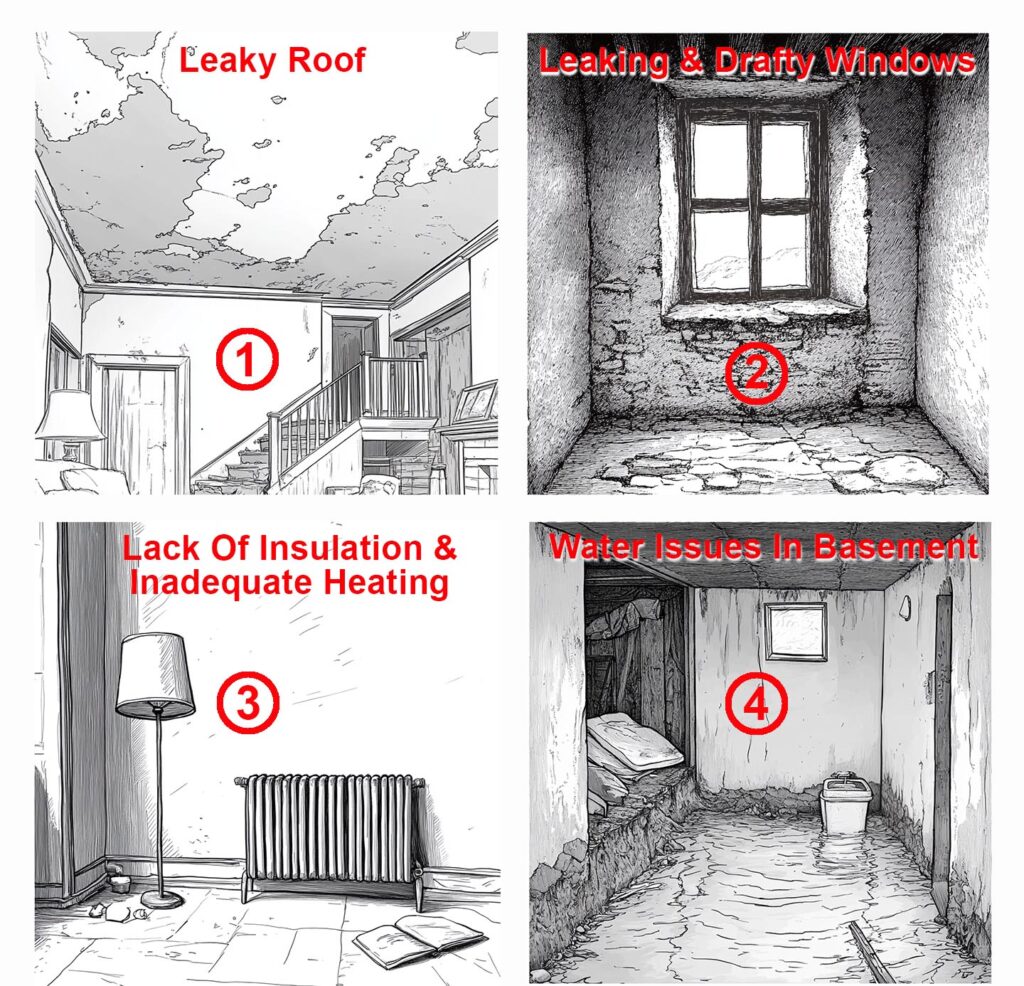
Work, Work, Work - Outside Chores Are Never Done

Is Aging In Place In Our Golden Years Worth It?
Some might ask why we try so hard to stay in homes that don’t meet our needs anymore. In reality, our connection to our homes goes beyond the building itself. For instance, our roots are deeply set in our neighborhood—the familiar faces, the streets we’ve walked for years, the trees we’ve seen grow, and the local pets and parks create a special place. We don’t want to lose all that in our golden years.
Homes are more than just buildings; they are sanctuaries. In these spaces, we can be with friends and family at our own pace, doing what we love, like gardening, cooking, reading, or listening to music. Also, they let us care for pets and enjoy hobbies. Not only do they offer a base for us, but also freedom for us and our pets to roam, giving us the independence we cherish.
We need to work towards Inclusive Neighborhoods For All Ages. Planners, architects, politicians, government officials, realtors & citizens must see the benefits of aging in place for seniors and work together to change the status quo.
Undoubtedly, retirement or nursing homes have their place in society, but moving to them too soon might not be the best choice. Sometimes, this move can feel forced. Looking at other options for aging in place can help us keep our way of life for as long as possible. Read what the current status is for aging in place.
The Road To Aging In Place
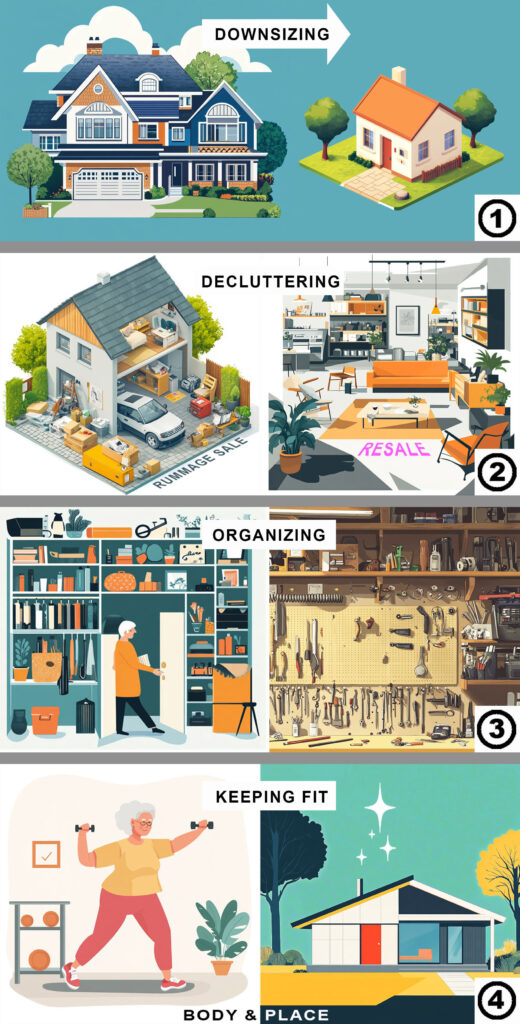
Healthy You, Healthy House
To stay in your home as long as possible, keep yourself relatively healthy, maintain your home and yards, and have enough money to support your lifestyle. First, regular yearly check-ups are important. They can help spot and stop health problems early. Running a home takes a sound mind and body, which is needed for aging in place.
Moreover, know where to get help when you need it. Phone numbers and helplines are listed in Seniors Help to help you find your way. Because our national health system isn’t perfect, there are tips to help you find a family doctor and avoid emergency rooms.
‘Aging in place’ is more than just a mindset. Keep your body, mind, and home in shape to ‘live long and prosper’. This brilliant short video is a good place to start.
Be Thrifty, Know Quality, Save Money


Let’s Not Be Hasty
I encourage you to explore my blog series to consider these issues further and to think about all the possibilities before making such a life-altering decision. There are options that you may not know about. It’s no more complicated than planning an extensive trip. And planning here is crucial and necessary. The following are the most common complaints heard after people moved from their own homes for good:
- I can hear my neighbors all the time.
- Playing music is no longer an option.
- Turning my hi-fi on loud enough is impossible.
- My workshop is something I miss dearly.
- Going outside without bumping into someone I know is awkward.
- My own backyard and garden are things I deeply miss.
- Privacy feels like a distant memory.
- There’s not enough space for my hobbies.
- The common areas feel impersonal
- It’s nothing like having my car nearby.
- Living under constant guard is very odd indeed.
- The peace and quiet of my own home are what I miss the most.
- Both me and my pets miss being close to the street and neighbourhood.
Small Houses, Small Lots, For Our Golden Years
To assist you, I have put together a monthly maintenance schedule for your home and yard. This post includes a step-by-step guide for finding reliable tradespeople. Also, living frugally can help you make the most of your fixed income. For homeowners, there are ways to earn extra money from your property. As you probably know already, owning a house is a lot of work. That’s why I am a proponent of keeping things small and simple.
If your house becomes too hard to live in but you still want to stay in a house, you may need to trade it for a more suitable home for seniors. In other words, downsizing. As we get older, smaller spaces are better for living independently. Still, they must meet all our needs, which is the main point of downsizing. If you own a lot which is larger than you can handle, consider dividing it into smaller lots. Smaller homes and lots are what seniors need, not apartments or shared living!
‘We don’t have enough homes to meet our aging needs’: The ideal home for aging in place might not even exist
Market Watch wrote this research article on the lack of proper occupant-owned houses for seniors and retirees. Read Here.
Here are the basic requirements for houses suitable for Aging In Place :
Single-Level Living: Avoiding stairs is crucial for mobility and safety. Include a small elevator if possible.
No-Step Entries: Easy access for those with mobility aids like wheelchairs or walkers.
Wide Hallways and Doorways: Accommodating mobility aids and ensuring easy movement within the home.
Accessible Bathrooms: Features like grab bars, walk-in showers, and raised toilets.
Low-Maintenance Design & Construction: Reducing the need for extensive upkeep, which can be physically and financially burdensome.
Proximity to Services: Being close to healthcare, grocery stores, and community centers.
Safety Features: Good lighting, non-slip flooring, and emergency response systems
Why Conventional Houses May Not Be Suitable For Aging In Place – it all depends on whether or not you take action soon enough.
Towards Truly Inclusive Neighborhoods For All Ages Where Young and Old Can Live Together Comfortably

1) Make It Easier For Zoning Changes So That A Larger Lot Can Be Severed Into Two Or More Lots For Smaller Houses
2) Build Smaller Houses Of About 1000 Sq.Ft. With A Roof Top Garden, Full Basement and Electrically Heated Small Parking Pad
3) Allow Roof Top Gardens Because There Won’t Be Much Yards To Lounge Around Or Plant Things.
4) Create Fully Usable Basements That Are Properly Built, Dry, Airy & Bright.
5) Zoning Must Allow Us To Build Smaller Houses That Suit Our Lifestyles So That We Can Stay In Our Own Neighborhoods.
Designed For Aging In Place / Independent Living : Multipurpose Space In A Compact House
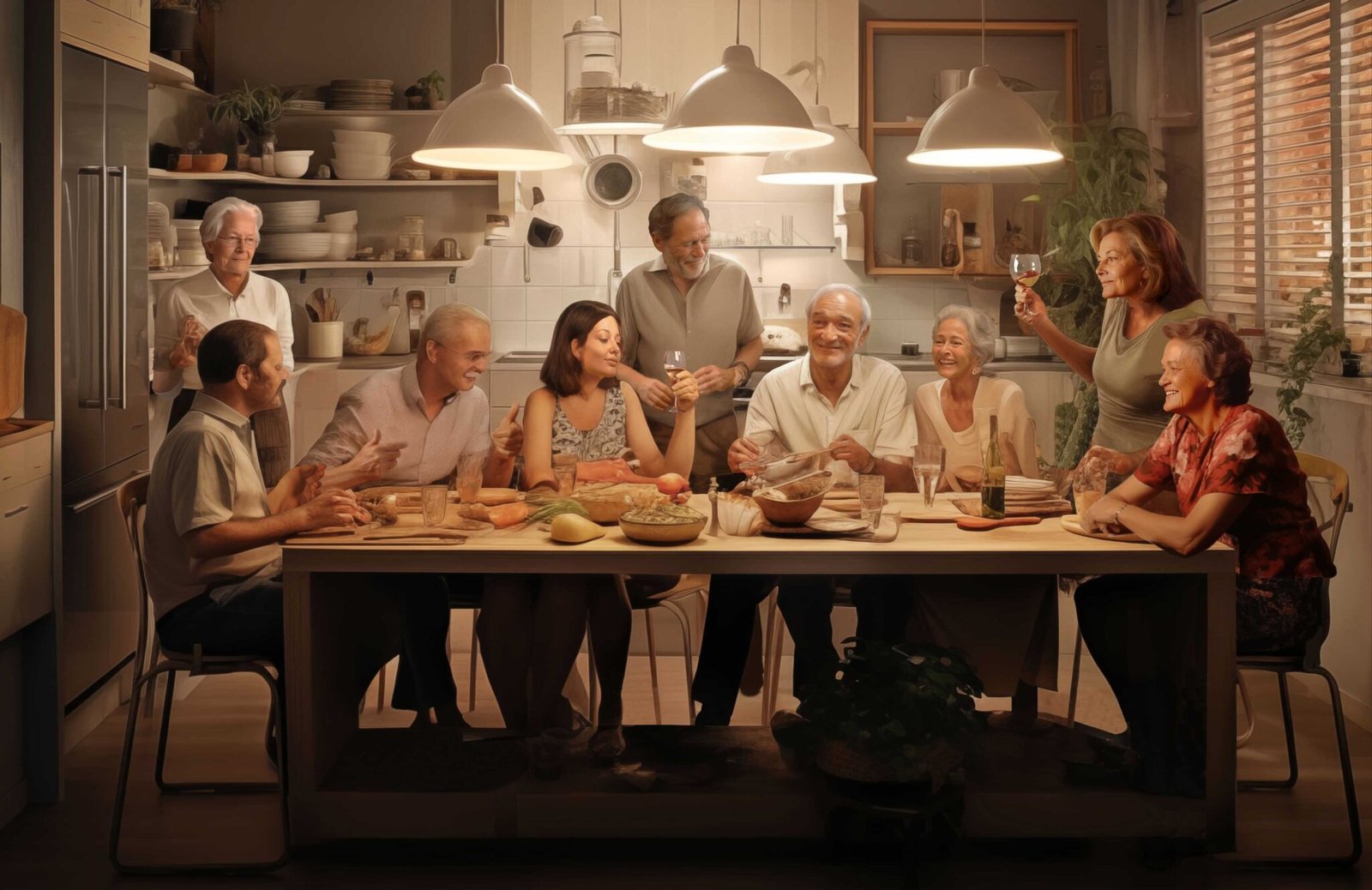
List of Referencing Articles :
Harvard, Housing America’s Older Adults
13 Health Risks for Seniors Who Age in Place Suburbia | Retirely
Expert Advice on Aging in Place – AgingCare.com
The Disadvantages of Aging in Place | Next Avenue
Four Benefits of Aging in Place | Next Avenue
Disclaimer
The information provided on this website, including but not limited to suggestions related to home safety, lightening personal possessions, and house maintenance, is for general informational purposes only. While we strive to provide accurate and up-to-date content, we make no representations or warranties of any kind, express or implied, regarding the accuracy, completeness, or suitability of the information provided. Any reliance you place on such information is strictly at your own risk.
By using this website, you agree that:
- You are solely responsible for ensuring the safety of your home environment. Our recommendations are provided as general suggestions, and we encourage you to consult with qualified professionals (e.g., electricians, contractors, or security specialists) before undertaking any actions or making changes that may impact the safety or structure of your home.
- Any guidance on organizing or reducing personal possessions is based on general principles. Individual circumstances may vary, and we recommend seeking the advice of professional organizers or counselors if needed. We are not responsible for any unintended outcomes from following such advice, including emotional or psychological impacts.
- You should perform routine house maintenance only to the extent you feel competent to do so. For any tasks beyond your skill level, we strongly advise hiring qualified tradespeople. We are not liable for any injuries, property damage, or other issues that may arise from attempting suggested tasks.
- The website does not assume responsibility for any loss, damage, or liability that may occur as a result of using the information provided, and we are not liable for any errors or omissions in the content.
In no event will we be held liable for any loss or damage, including without limitation, indirect or consequential loss or damage, arising out of or in connection with the use of this website or the information contained herein.
Please consult with professionals where necessary and take personal responsibility for the actions you choose to implement in your home.